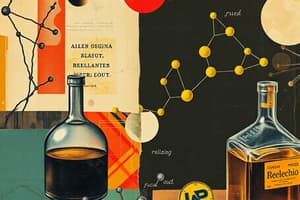Podcast
Questions and Answers
Why do alcohols have higher boiling points than their corresponding hydrocarbons?
Why do alcohols have higher boiling points than their corresponding hydrocarbons?
- Presence of an alkyl group
- Insolubility in water
- Presence of hydrogen bonding (correct)
- Low polarity
What property makes alcohols polar?
What property makes alcohols polar?
- High boiling point
- Presence of a hydroxyl group (correct)
- Insolubility in water
- Presence of an alkyl group
Which industry commonly uses alcohols as solvents in drug formulations and antiseptics?
Which industry commonly uses alcohols as solvents in drug formulations and antiseptics?
- Automotive industry
- Food industry
- Pharmaceutical industry (correct)
- Textile industry
In the synthesis of phenol, what is phenol generally synthesized from?
In the synthesis of phenol, what is phenol generally synthesized from?
Which type of alcohol has a hydroxyl group attached to a tertiary carbon atom?
Which type of alcohol has a hydroxyl group attached to a tertiary carbon atom?
What role do alcohols often play in organic reactions?
What role do alcohols often play in organic reactions?
Which industrial sector commonly uses alcohols as solvents and chemical intermediates?
Which industrial sector commonly uses alcohols as solvents and chemical intermediates?
What is the primary byproduct when phenol is produced through the Cumene process?
What is the primary byproduct when phenol is produced through the Cumene process?
Which reaction type can phenol undergo to form various substituted phenols?
Which reaction type can phenol undergo to form various substituted phenols?
What type of alcohol has a hydroxyl group bonded to a carbon atom that is bonded to only one other carbon atom?
What type of alcohol has a hydroxyl group bonded to a carbon atom that is bonded to only one other carbon atom?
Which method involves the hydrolysis of Acetophenone to produce phenol?
Which method involves the hydrolysis of Acetophenone to produce phenol?
When phenol is oxidized, what compound can it form?
When phenol is oxidized, what compound can it form?
Flashcards are hidden until you start studying
Study Notes
Alcohols and Phenol: A Chemical Duo
Alcohols and phenol, both belonging to the family of organic compounds, share some similarities and differences. In this article, we'll explore the properties and uses of alcohols, the synthesis of phenol, and its various reactions.
Alcohols
Alcohols are organic compounds containing a hydroxyl group (-OH) bonded to an alkyl or aryl group. They generally exist in three forms: primary (1°), secondary (2°), and tertiary (3°) alcohols. The properties of alcohols include:
- Polarity: Alcohols are polar due to the presence of the highly electronegative oxygen atom.
- Boiling Points: Alcohols have higher boiling points than their corresponding hydrocarbons due to the presence of the O-H bond, which results in stronger intermolecular forces.
- Solubility: Alcohols are soluble in water due to the hydrogen bonding between the hydroxyl group of the alcohol and the hydrogen atoms of water molecules.
Alcohols are widely used in various industries, including pharmaceuticals, cosmetics, and as solvents. They're often used as reactants in chemical synthesis and as reducing agents in organic reactions.
Uses of Alcohols
- Pharmaceuticals: Alcohols such as ethanol and isopropanol are commonly used as solvents in drug formulations, disinfectants, and antiseptics.
- Cosmetics: Alcohols are used as ingredients in many cosmetic products due to their skin-hydrating properties.
- Industrial processes: Alcohols are used as solvents and chemical intermediates in various industrial processes.
Synthesis of Phenol
Phenol, also known as hydroxybenzene, is an aromatic compound that contains a hydroxyl group (-OH) bonded to a benzene ring. The synthesis of phenol historically involved the electrolysis of benzene-sulfonic acid in an alkaline medium, but today it's primarily produced via the following methods:
- Cumene Process: This method involves the oxidation of cumene (isopropylbenzene) to form phenol and acetone as byproducts.
- Hydrolysis of Acetophenone: Acetophenone can be hydrolyzed in the presence of a catalyst, such as sulfuric acid, to form phenol and acetic acid.
Reactions of Phenol
Phenol is a versatile compound that undergoes various reactions, including:
- Electrophilic aromatic substitution: Phenol can undergo electrophilic substitution reactions to form various substituted phenols.
- Nucleophilic aromatic substitution: Phenol can be replaced by a nucleophile, forming a variety of substituted phenols and aryl halides.
- Formation of quinones: Phenol can be oxidized to form quinones, which can further undergo electrophilic aromatic substitution.
Types of Alcohols
Alcohols can be classified by their carbon chain length and the number of carbon atoms bonded to the alcohol's hydroxyl group. The classification includes:
- Primary alcohols (1°): An alcohol with a hydroxyl group bonded to a carbon atom that is bonded to only one other carbon atom.
- Secondary alcohols (2°): An alcohol with a hydroxyl group bonded to a carbon atom that is bonded to two other carbon atoms.
- Tertiary alcohols (3°): An alcohol with a hydroxyl group bonded to a carbon atom that is bonded to three other carbon atoms.
Understanding the properties, synthesis, and reactions of alcohols and phenol are essential in various scientific disciplines ranging from organic chemistry to materials science, pharmaceuticals, and environmental chemistry. With the knowledge of these compounds, we can create innovative solutions to real-world problems, drive technological advancements, and improve our quality of life.
Studying That Suits You
Use AI to generate personalized quizzes and flashcards to suit your learning preferences.




